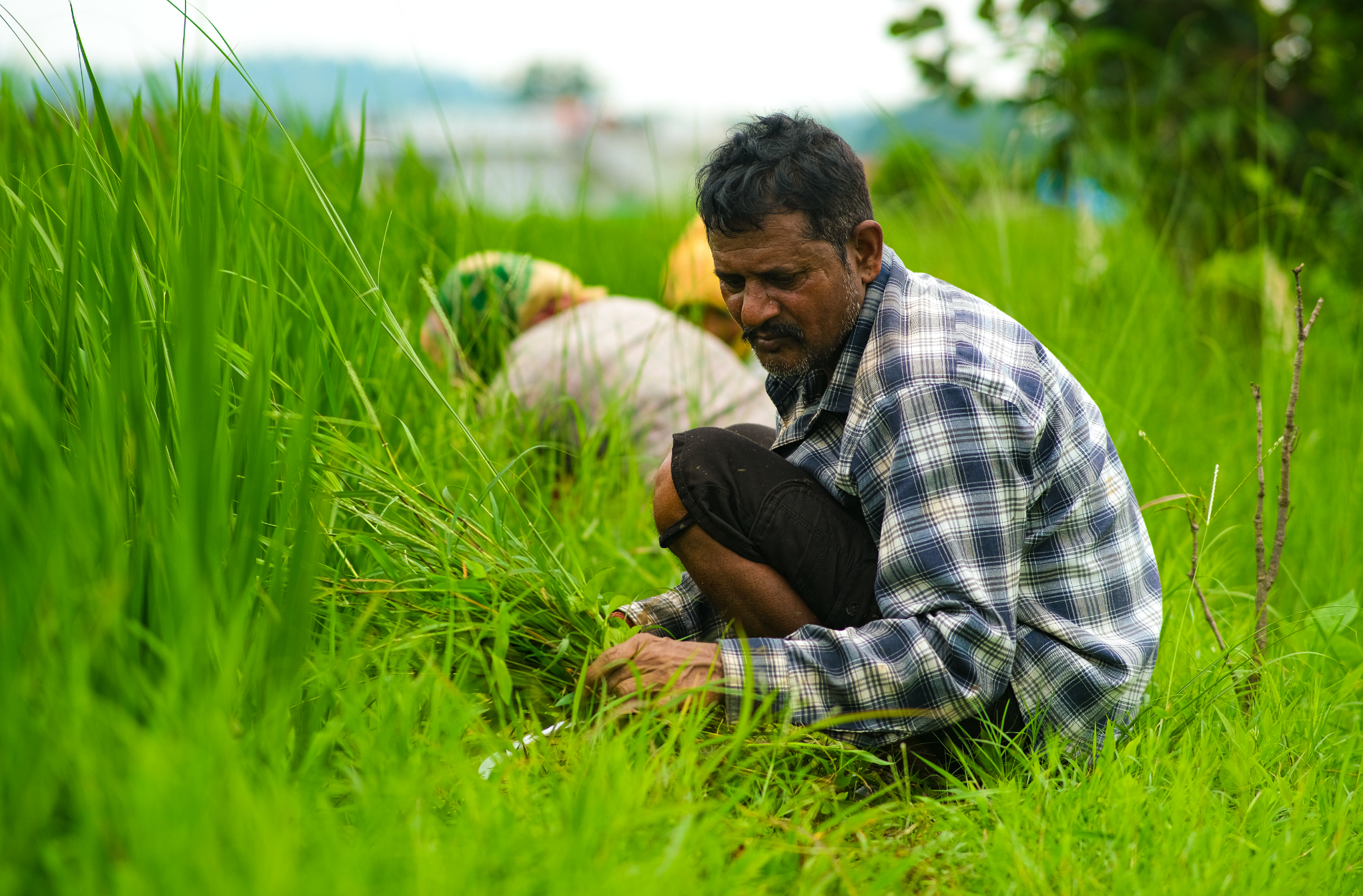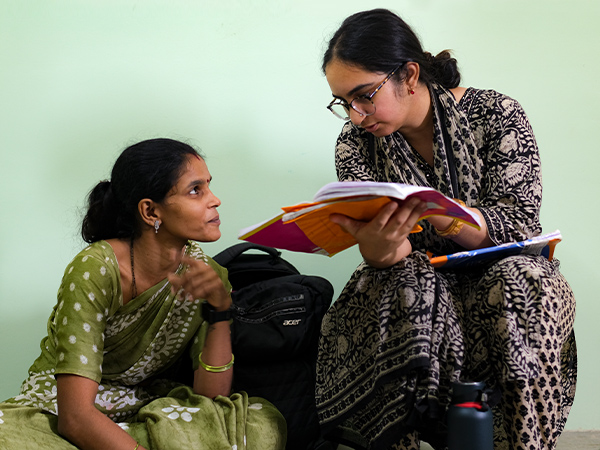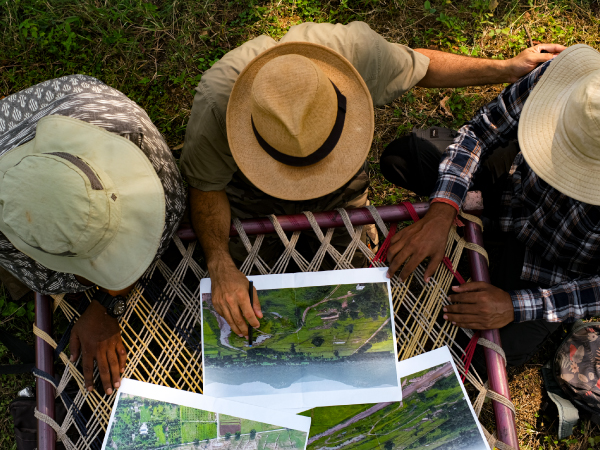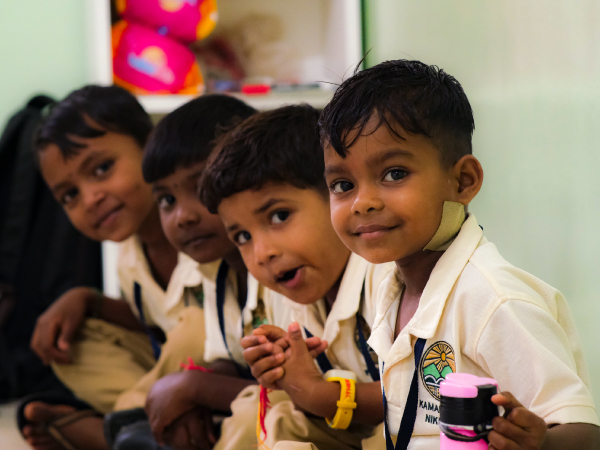We recognize that the health of the land is deeply intertwined with the well-being of the people who rely on it. In Kathiwada, where most families depend on farming for their livelihoods, the land is more than a resource—it’s a lifeline.

Years of monocropping have depleted the soil, and improper waste management has polluted waterways, threatening both livelihoods, public health and the environment.
Our focus is on revitalization of this fragile ecosystem – introducing sustainable farming to nurture the land back to health and addressing sanitation challenges to reduce pollution. Zones have been dedicated for experimentation in innovative farming practices such as permaculture.
Kathiwada experiences abundant rainfall and we are looking at systems to ensure this vital resource is captured and used effectively. Projects in this vector are about environmental stewardship and encouraging a harmonious relationship between people and the land.
- REGENERATIVE PRACTICES
Permaculture Campus
LOCATION
Swarna Bhoomi Kathiwada Permaco
Zone 5, Kathiwada 2034
Kathiwada faces the dual challenges of soil degradation from intensive and extensive agricultural practices, which have overexploited the land and compromised its long-term health. To address this, the Kathiwada 2034 initiative has embraced permaculture to regenerate the environment and restore balance. By rehabilitating land near the palace and river, the Swarnbhoomi Permaculture project is creating a vibrant campus that integrates people, animals, and landscapes into a thriving ecosystem. This campus demonstrates sustainable ways to meet food, energy, and shelter needs while fostering biodiversity, improving soil health, and maintaining a near-zero carbon footprint.
In its early stages, the campus is already showcasing the power of these innovative practices to farmers and landowners resistant to change. Over time, it aspires to become a hub for learning and inspiration, attracting volunteers, students, and organizations while encouraging regional landowners to adopt regenerative practices. This living example of sustainability aims to reshape Kathiwada’s future and spark a broader movement for environmental renewal.
- SUSTAINABLE PRACTICES
Drip-irrigation project
LOCATION
Raaj Mahal Horticulture Zone
Zone 2, Kathiwada 2034
GOAL
Although modern micro-irrigation systems such as drip-irrigation have been around for almost a century, the majority of the world still uses traditional methods of surface irrigation and Kathiwada is no different. We wanted to introduce this technology to the region to see what types of effects it would have on water usage and crop yields.
Drip-irrigation allows efficient water and nutrient delivery directly to the root zone in a uniform pattern across an entire field. The savings on water usage are considerable as wastage through evaporation and run-off are minimized. Crop yields are consistent and of a higher quality. Farmers save on energy as drip irrigation systems work on low pressure. Micro irrigation also reduces dependency on the weather systems.
ACTION & OUTCOMES
We piloted a drip irrigation project at our centre so farmers could see how it operates and learn how to set up the system on their own land. Subsequently, many farmers adopted the technology and availed welfare benefits from the government. Farmers have begun to learn implementation from each other now leading to a reduction in visits to our farm. Our initial intervention to introduce the technology has been successful.
PARTNERSHIPS
We consulted certified companies such as Jain Irrigation and Rivilus who pioneered distribution of this technology for our initial set-up
- SUSTAINABLE PRACTICES
- SKILL DEVELOPMENT
Farmer Training Institute
LOCATION
Rana Digvijay Sinh Krishi Vigyan Kendra
Raaj Mahal Organic Farming Zone
Zone 3 – Kathiwada 2034
GOAL
To introduce organic farming to the region and model a pathway for farmers seeking to transition to this method.
In the long-term, we want to inspire the entire region to embrace organic farming. We envision the creation of a Farmer Producing Organization (FPO), complete with its own warehouse and distribution network. This setup will enable farmers to bypass middlemen, sell directly to consumers, and secure better incomes. By cutting out the middlemen, farmers will not only enjoy higher earnings but also gain greater control over their produce and its market.
THE PROBLEM
We are alarmed at the usage of intensive chemical fertilizers and pesticides for farming in the region. It raises concerns about the loss of biodiversity, the health of our soil, our food, and ultimately, our community’s well-being. These methods are attractive to farmers because they lead to abundant yields, and the individual farmer with a small land-holding is unwilling to risk an entire season to experiment with organic methods. The fear of substantially lower yields and financial losses are daunting. Additionally, erratic weather patterns, shortened growing seasons, and market vulnerabilities compound these challenges, leaving farmers with limited options.
ACTION & OUTCOMES
We established a wholly sustainable and organic farming zone to model a healthy food production system. In doing so, we were able to demonstrate that healthy, chemical-free food production can be both practical and rewarding. The produce is wholesome, certified and tested.
Beyond demonstration, we focus on capacity building to empower farmers with knowledge and tools for modern, sustainable farming practices. Farmers are trained in newer techniques, the use of bio-fertilizers, e-governance, and becoming digitally savvy. This not only modernizes their approach but also equips them to adapt to evolving agricultural trends.
We introduced resilient crops that provide better incomes with reduced vulnerability to market fluctuations. Crops requiring less water were encouraged, helping farmers adapt to the stresses of erratic weather and shortened seasons. By incorporating nitrogen-fixing plants and trees that act as carbon sinks, we are also improving carbon absorption on farms. Similarly, the use of Vetiver grass has been promoted to reduce soil erosion and enhance soil health.
Yields are expectedly lower compared to yields resulting from conventional methods but some farmers have already begun to see that the benefits outweigh the risks. Our initiative provides guidance and resources to ensure that for farmers willing to transition, the risks are manageable.
With these interventions, we are paving the way for a future where organic farming becomes a cornerstone of sustainable agriculture in the region.
- REGENERATIVE PRACTICES
Permaculture Campus
LOCATION
Swarna Bhoomi Kathiwada Permaco
Zone 5, Kathiwada 2034
Kathiwada faces the dual challenges of soil degradation from intensive and extensive agricultural practices, which have overexploited the land and compromised its long-term health. To address this, the Kathiwada 2034 initiative has embraced permaculture to regenerate the environment and restore balance. By rehabilitating land near the palace and river, the Swarnbhoomi Permaculture project is creating a vibrant campus that integrates people, animals, and landscapes into a thriving ecosystem. This campus demonstrates sustainable ways to meet food, energy, and shelter needs while fostering biodiversity, improving soil health, and maintaining a near-zero carbon footprint.
In its early stages, the campus is already showcasing the power of these innovative practices to farmers and landowners resistant to change. Over time, it aspires to become a hub for learning and inspiration, attracting volunteers, students, and organizations while encouraging regional landowners to adopt regenerative practices. This living example of sustainability aims to reshape Kathiwada’s future and spark a broader movement for environmental renewal.
- SUSTAINABLE PRACTICES
Drip-irrigation project
LOCATION
Raaj Mahal Horticulture Zone
Zone 2, Kathiwada 2034
GOAL
Although modern micro-irrigation systems such as drip-irrigation have been around for almost a century, the majority of the world still uses traditional methods of surface irrigation and Kathiwada is no different. We wanted to introduce this technology to the region to see what types of effects it would have on water usage and crop yields.
Drip-irrigation allows efficient water and nutrient delivery directly to the root zone in a uniform pattern across an entire field. The savings on water usage are considerable as wastage through evaporation and run-off are minimized. Crop yields are consistent and of a higher quality. Farmers save on energy as drip irrigation systems work on low pressure. Micro irrigation also reduces dependency on the weather systems.
ACTION & OUTCOMES
We piloted a drip irrigation project at our centre so farmers could see how it operates and learn how to set up the system on their own land. Subsequently, many farmers adopted the technology and availed welfare benefits from the government. Farmers have begun to learn implementation from each other now leading to a reduction in visits to our farm. Our initial intervention to introduce the technology has been successful.
PARTNERSHIPS
We consulted certified companies such as Jain Irrigation and Rivilus who pioneered distribution of this technology for our initial set-up
- SUSTAINABLE PRACTICES
- SKILL DEVELOPMENT
Farmer Training Institute
LOCATION
Rana Digvijay Sinh Krishi Vigyan Kendra
Raaj Mahal Organic Farming Zone
Zone 3 – Kathiwada 2034
GOAL
To introduce organic farming to the region and model a pathway for farmers seeking to transition to this method.
In the long-term, we want to inspire the entire region to embrace organic farming. We envision the creation of a Farmer Producing Organization (FPO), complete with its own warehouse and distribution network. This setup will enable farmers to bypass middlemen, sell directly to consumers, and secure better incomes. By cutting out the middlemen, farmers will not only enjoy higher earnings but also gain greater control over their produce and its market.
THE PROBLEM
We are alarmed at the usage of intensive chemical fertilizers and pesticides for farming in the region. It raises concerns about the loss of biodiversity, the health of our soil, our food, and ultimately, our community’s well-being. These methods are attractive to farmers because they lead to abundant yields, and the individual farmer with a small land-holding is unwilling to risk an entire season to experiment with organic methods. The fear of substantially lower yields and financial losses are daunting. Additionally, erratic weather patterns, shortened growing seasons, and market vulnerabilities compound these challenges, leaving farmers with limited options.
ACTION & OUTCOMES
We established a wholly sustainable and organic farming zone to model a healthy food production system. In doing so, we were able to demonstrate that healthy, chemical-free food production can be both practical and rewarding. The produce is wholesome, certified and tested.
Beyond demonstration, we focus on capacity building to empower farmers with knowledge and tools for modern, sustainable farming practices. Farmers are trained in newer techniques, the use of bio-fertilizers, e-governance, and becoming digitally savvy. This not only modernizes their approach but also equips them to adapt to evolving agricultural trends.
We introduced resilient crops that provide better incomes with reduced vulnerability to market fluctuations. Crops requiring less water were encouraged, helping farmers adapt to the stresses of erratic weather and shortened seasons. By incorporating nitrogen-fixing plants and trees that act as carbon sinks, we are also improving carbon absorption on farms. Similarly, the use of Vetiver grass has been promoted to reduce soil erosion and enhance soil health.
Yields are expectedly lower compared to yields resulting from conventional methods but some farmers have already begun to see that the benefits outweigh the risks. Our initiative provides guidance and resources to ensure that for farmers willing to transition, the risks are manageable.
With these interventions, we are paving the way for a future where organic farming becomes a cornerstone of sustainable agriculture in the region.
Get Involved.
Make a Difference.
Real, lasting change takes collaboration, commitment, and a shared vision. At Kathiwada Foundation, we are dedicated to long-term initiatives that uplift communities and reshape futures. But we can’t do it alone.
Whether you’re passionate about volunteering, eager to collaborate, or ready to contribute, there’s a place for you in our mission. We work side by side with individuals and experts, engaging with communities and stakeholders to drive meaningful change from the ground up.
Collaborate with us
Knowledge-sharing and experimentation fuels meaningful change—join us in exploring bold ideas and creating lasting impact together.
Give to us
Your contributions will bring us closer to the change we are working hard to achieve.


